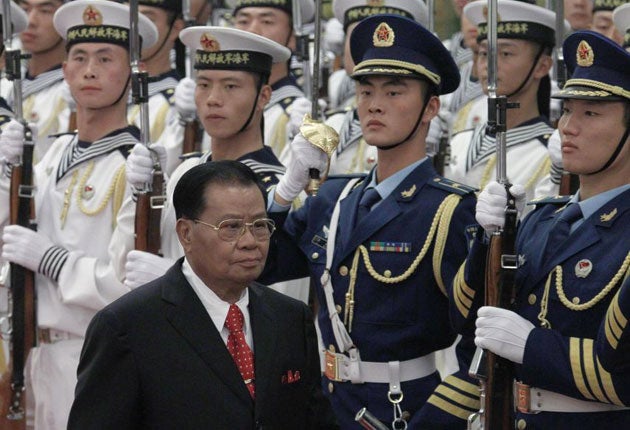The faces of change in Burma
Three women are standing up to the junta – by taking part in an election they know they can't win

She has been described as a "princess" of Burmese politics, but for Cho Cho Kyaw Nyein, the daughter of an independence hero, the pursuit of her father's dream of democracy in Burma is far more important than the trappings of her elite status. "I have sold all my gold, all my jewellery," said the 62-year-old, who is standing as an opposition candidate in Burma's 7 November election, the first in 20 years. "Everything that I put aside for my old age, for my medical fees, I have put into this campaign."
With her childhood friends Mya Than Than Nu and Nay Ye Ba Swe, Ms Kyaw Nyein is joint-secretary of the opposition Democratic Party, which hopes to field 50 candidates in the vote. The so-called "three princesses" are all daughters of senior Burmese ministers who held office during the short period of democratic rule that followed independence from Britain in 1948.
Despite their pedigree, the three have endured the same financial hardship, constant surveillance and intimidation faced by all opposition candidates, in order to fight an election they know they cannot win. Their aim, says Ms Kyaw Nyein, after nearly half a century of military rule, is simply to have their voices heard.
"Even though this election is very unfair, we want to be there in the parliament with the army people. We will be fewer than them, but we will raise our voices if we have to," said Ms Kyaw Nyein, who, like her father and mother, served several years in Rangoon's Insein Prison for her dissident activities.
Followed by plain-clothed special branch officers, she has been on the campaign trail since early September in the rural constituency in central Burma that she hopes to represent. "By motorbike, bicycle or on foot I am getting to the most remote places to explain the meaning of the election and to persuade the people to vote for us," she said.
The splintered opposition movement is running against the might of the Burmese junta's proxy party, the Union Solidarity and Development Party (USDP), which is amply funded and stacked with ex-military candidates, including its Prime Minister, Thein Sein.
The party has offered new members and potential voters sweeteners such as cheap mobile phone access and gifts including spectacles, sarongs, food and cash. "I say to people: 'Take the presents, but don't vote for those lousy people,'" laughs Ms Kyaw Nyein, an energetic mother of five grown-up children and three adopted teenagers.
Election rules drawn up by the regime gave parliamentary candidates just two weeks to raise the £325 needed to register to stand, not a large sum in the West but equivalent to an average annual wage in Burma. As a result, cash-strapped opposition parties have only managed to put up candidates in less than 20 per cent of all constituencies, leaving the USDP an open field across much of the country. In some of the border areas where ethnic insurgents have been fighting the government, and where ethnic opposition parties were expected to do well, the regime has called off the election altogether.
The many injustices have proved too much for Burma's most famous opposition party, the National League for Democracy, led by detained democracy icon Aung San Suu Kyi. From her home in Rangoon, where she is held under house arrest, Ms Suu Kyi urged her National League for Democracy (NLD) party to boycott the 7 November vote, charging that the process is unfair and undemocratic. As a consequence, the party that won a resounding victory in the last elections in 1990 – a result which was ignored by the generals – was disbanded by the authorities.
But confusing the picture for voters, renegade NLD members have formed a breakaway party to contest the election, and have been joined by younger political hopefuls who, having witnessed the failure of Burma's "Saffron Revolution" in 2007, feel frustrated by the failure of the opposition movement to break years of autocratic rule.
"We respect Aung San Suu Kyi's decision, but we think it is the wrong one," said 38-year-old Myat Nyarna Soe, secretary of the Rangoon division of the newly formed National Democratic Force (NDF). "How can we negotiate if we are quiet? I want to go to parliament and persuade the government that they need to change for the sake of the country."
A doctor and former civil servant in the department of health, Dr Nyarna Soe only became involved in politics this year. "Things weren't getting better, so I decided to quit as a government servant. I could not remain behind the curtain any longer."
The NDF's campaigning ambitions are limited: they plan to print pamphlets and posters, paid for by party members who have sold their cars and their houses to support the cause. The party will be by far the biggest among the opposition groups, fielding 163 candidates. The USDP, however, is likely to fight nearly all of the 498 civilian seats in the two-chamber national parliament. A further 166 seats will be reserved for unelected military officers.
Dr Nyarna Soe accepts that there will be no need for the junta to tamper with the election results this time. "There is a difference in manpower, money, everything. It's a competition between them and us, and they've already won," he said. "But I believe this is our only gateway. If there is another way, please tell me."
Join our commenting forum
Join thought-provoking conversations, follow other Independent readers and see their replies
Comments
Bookmark popover
Removed from bookmarks